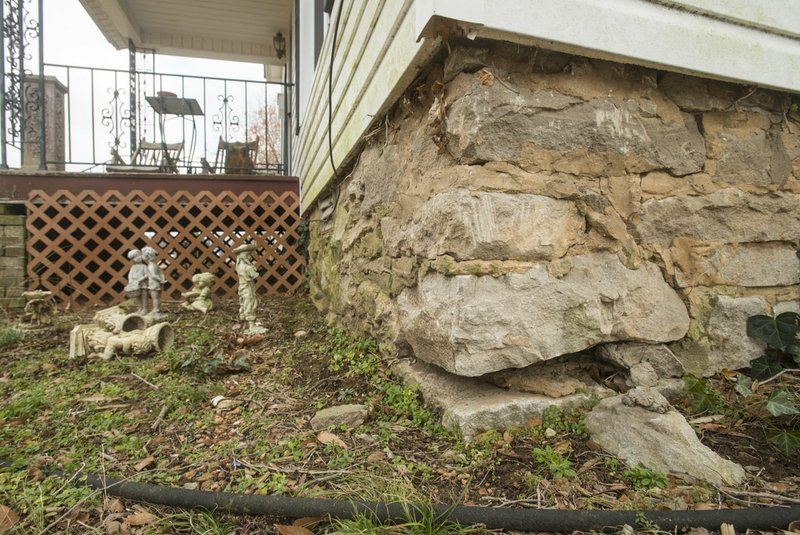ROGERS -- The city plans to burn down Larry Rowe's house in his "quiet neighborhood" and build a new one.
Rowe is the Rogers Cemetery manager and lives in a city-owned house at the cemetery. Rogers plans to build a new home for Rowe and his wife because of the current one's poor condition, said Wendy Jones, director of operations for the Parks and Recreation Department. The department oversees the cemetery.
The floor inside sags, and the house has electrical problems.
"It's part of his job -- part of his pay -- to live in this house and to take care of the cemetery," Jones said.
The cemetery manager's salary is about $58,800, according to an email from Financial Administrator Jennifer Slingsby.
Rowe has lived on-site since 2000 when he became manager. He's essentially always on call.
Vandals struck the cemetery in the 1990s, and the cemetery manager at the time began living on-site, Jones said.
"The thought process was we need to have someone on the property, and that way when vandals came in at night, someone was here to call the police or to run them off," she said. "And it made a huge change, so it just carried on."
Police didn't receive any vandalism calls at the cemetery this year, although it used to be a problem, spokesman Keith Foster said. The department has responded to a couple of calls for people sleeping at the cemetery, though.
The city's 2019 budget includes $155,000 for the new house and to house Rowe at a temporary location during construction, Finance Director Casey Wilhelm said. Jones said the goal is for Rowe to be moved into his new home by Memorial Day weekend, one of the busiest times for the cemetery.
The three-bedroom, 1½-bath home will be a modular house from a company that builds multiples of the same home. The city is working out the details of which company will build the house, Jones said.
The Fire Department will train new firefighters by burning down the current house.
Life at the cemetery
Rowe is one of two full-time, year-round cemetery employees. The city typically hires two seasonal employees during the summer. Duties range from working with funeral homes and maintaining the more than 18 acres to burying babies and ashes to occasionally serving as pallbearer.
Funeral homes generally subcontract people who bury bodies, but cemetery staff are responsible for handling ashes and infant burials. Babies are buried at Dogwood Acres, a special section of the cemetery.
"When I first started working here, my daughter was 4 years old, and to bury my first baby was almost traumatic," Rowe said. "What would happen if that was my kid?"
People often comment along the lines of, "I couldn't live there" or "I couldn't do that job" when he tells them he lives at a cemetery, he said.
A sense of humor goes a long way, Rowe and Jones said. Rowe once jumped out from behind a headstone when his neighbors were having a sleepover and the kids and a chaperone were in the cemetery. He jokes about his quiet neighbors and he works over more people than any other city department.
Jokes aside, Rowe also takes pride in making the cemetery look nice for families whose relatives are buried there and honoring veterans on Memorial Day. He also said he enjoys when people share stories of family history with him.
An eternity of costs
Government-owned cemeteries that have an employee live on-site aren't the norm, said Robert Fells, general counsel at the International Cemetery, Cremation and Funeral Association.
Having someone live at the cemetery used to be more common, Fells said, as was funeral directors living at funeral homes.
A cemetery manager who lives on-site often prevents vandalism from teens looking to cause trouble or more sinister motivations such as vandalism by Satanic cults, he said.
Springdale, Bentonville and Fort Smith own cemeteries. Springdale spokeswoman Ashley Earhart said the city has someone who maintains Bluff Cemetery, but no city employee lives there.
All cemeteries generally have to register with the Arkansas Department of Health if they are just starting or are changing property lines, said Meg Mirivel, department spokeswoman. The department doesn't have a list of Arkansas cities that own cemeteries.
Private cemeteries are usually owned by religious or nonprofit organizations, Fells said. Generally, cemeteries don't make money because after a one-time burial fee comes an eternity of maintenance, maintenance equipment and salaries for people who do the maintenance.
Private cemeteries often receive donations and sometimes volunteer work, while government-owned cemeteries are generally paid for with tax money, he said.
"Cemeteries are unique in that they are the only businesses that service what they sell forever," he said.
A basic burial plot costs $350 at Rogers Cemetery.
"I can't say that the city has ever looked at the cemetery as to make money," Jones said. "It's to cover costs. It's a service. We're a government. We provide a service. The idea of making money on someone's grief is not an idea the city of Rogers has ever had."
NW News on 12/23/2018

